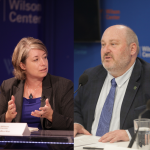-
Geoff Dabelko and Sharon Burke on Environmental Peacebuilding in an Era of Great Power Competition
February 7, 2020 By Eliana Guterman United States and China are on the road to war, said Senior Advisor of New America’s Resource Security Program, Sharon Burke in this week’s Friday Podcast. “And if you’re an environmental peacebuilder and you’re not thinking about that, you might want to,” she added. She spoke with Geoffrey Dabelko, Professor at Ohio University and Senior Advisor to ECSP, at the first ever International Conference on Environmental Peacebuilding in October 2019 at the University of California, Irvine. It’s a war we can’t afford, said Burke. “But we’re not doing anything to avoid it at the moment, in my opinion, other than deterrence.”The United States and China are on the road to war, said Senior Advisor of New America’s Resource Security Program, Sharon Burke in this week’s Friday Podcast. “And if you’re an environmental peacebuilder and you’re not thinking about that, you might want to,” she added. She spoke with Geoffrey Dabelko, Professor at Ohio University and Senior Advisor to ECSP, at the first ever International Conference on Environmental Peacebuilding in October 2019 at the University of California, Irvine. It’s a war we can’t afford, said Burke. “But we’re not doing anything to avoid it at the moment, in my opinion, other than deterrence.”
United States and China are on the road to war, said Senior Advisor of New America’s Resource Security Program, Sharon Burke in this week’s Friday Podcast. “And if you’re an environmental peacebuilder and you’re not thinking about that, you might want to,” she added. She spoke with Geoffrey Dabelko, Professor at Ohio University and Senior Advisor to ECSP, at the first ever International Conference on Environmental Peacebuilding in October 2019 at the University of California, Irvine. It’s a war we can’t afford, said Burke. “But we’re not doing anything to avoid it at the moment, in my opinion, other than deterrence.”The United States and China are on the road to war, said Senior Advisor of New America’s Resource Security Program, Sharon Burke in this week’s Friday Podcast. “And if you’re an environmental peacebuilder and you’re not thinking about that, you might want to,” she added. She spoke with Geoffrey Dabelko, Professor at Ohio University and Senior Advisor to ECSP, at the first ever International Conference on Environmental Peacebuilding in October 2019 at the University of California, Irvine. It’s a war we can’t afford, said Burke. “But we’re not doing anything to avoid it at the moment, in my opinion, other than deterrence.”In a primarily adversarial relationship, said Burke, does environmental peacebuilding have the ability to be a bright spot on an otherwise bleak path toward a seemingly inevitable war?
According to Burke, the role of natural resources has become relevant to strategic investments and security in two main ways. First, resources are already a part of the competition, and will increasingly shape the struggle for both material resources and geopolitical influence. The effects of climate change on resource availability will also drive the priorities of both China and the United States as the two largest economies in the world. A key difference, Burke points out, is size. The United States has a population of 330 million people, compared to China’s population of 1.4 billion. Another difference relates to how the countries are trying to address resource gaps related to climate change. China has begun diversifying resource suppliers and taking into account the strain climate change will put on the global supply chain, especially in the agricultural and critical minerals sectors. On the other hand, the United States puts greater trust in the markets and lacks a natural security strategy.
Dabelko compared the current situation with China to the environmental peacebuilding efforts between the United States and Soviet Union during and after the Cold War. The U.S. military engaged with other militaries globally during this period using environmental and scientific exchanges as a means to open a dialogue and reach a secure end. In recent years, there have not even been attempts at these types of exchanges with an environmental component. Burke believes that it’s still worth a try. “[The environment is] certainly going to be a point of contention going forward,” said Burke. “So why can’t it also be a point of collaboration?”
Burke and Dabelko wrapped up the conversation by imagining a possible future marked by a changing climate. Burke hypothesized that as climate change affects global agriculture, we will need trade to adjust and adapt to the changing patterns of food production. Burke noted that that our planet does have the capacity to grow enough food even as the population grows, but the areas where food is grown will need to shift as the climate changes. In order to thrive, we will need to become more flexible with trade and stay away from locking in strictly bilateral deals. Climate change may create a powerful need for global collaboration and cooperation, Burke concluded.
This interview was recorded at the first International Conference on Environmental Peacebuilding, hosted by the Environmental Law Institute, Duke University, University of California, Irvine, and the Blum Center for Poverty Alleviation in October 2019.
Sources: New America, Environmental Peacebuilding Association, New Security Beat
Friday Podcasts are also available for download on iTunes and Google Podcasts.
 A Publication of the Stimson Center.
A Publication of the Stimson Center.

 United States and China are on the road to war, said Senior Advisor of New America’s
United States and China are on the road to war, said Senior Advisor of New America’s 




